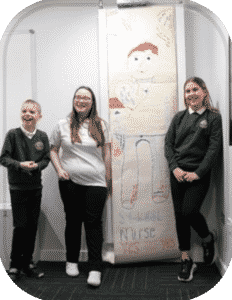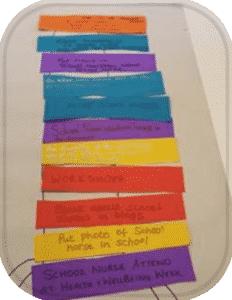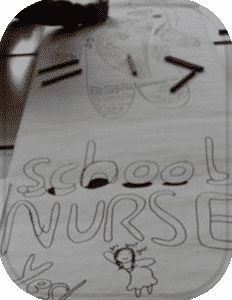
Dr Elaine Allan, Lead School Nurse and Robert Gordon University Lecturer shares her blog encouraging the adoption of a rights-based approach in children’s services. Her blog references the Imagineers Project developed in Aberdeen which highlights the benefits of listening to children and young people.
Dr Allan notes the special relevance of this approach during COVID-19 where many children may be more vulnerable.
School nurses support children with a host of issues from age-appropriate relationships and sex education to mental health and healthy eating. Along with other key professionals, school nurses are some of those at the front line when identifying abuse and neglect in children. I have written this blog to share details of the Imagineers project which will benefit school nurses, HEI offering nursing courses and all those who work with children and young people.
Underpinning Principles
Human rights as set out by the United Nations Charter of the Rights of the Child (UNCRC) aim to empower children. The charter includes the right of all children to have access to health services that meet their needs. Children have the right to express their views in all matters affecting them and these views must be given due accordance within the child’s age and maturity. The UNCRC states that “children have the right to be heard, listened to and taken seriously in all decisions which will affect them”. Anyone delivering children’s services should genuinely engage with children, especially when designing or improving children’s services. We must ensure we are actively taking account of children’s views wherever feasible. It is heartening to me that one of Scotland’s key strategic priorities is to champion the inclusion of children and young people. To ensure children are supported and able to participate in the decision-making I believe we must empower them and help them better understand their rights.

Imagineers
Early in 2016 Imagining Aberdeen began with 300 children from various primary and secondary schools. The group were presented with a single task, to imagine how Aberdeen could be a city where children are healthy, happy, and safe. A condensed group then became Imagineers, representatives for their schools who would capture ideas and important messages through art and video. The Imagineers are now a group of 40 children, aged 9-13, from across the city who connect with one another and their Imagineer Champions to discuss their vision for the future. The four main themes we ask them to discuss are mental health, early years and families, the transition to adulthood and attainment.
Imagineer Champions
The role of the Imagineer Champion is to listen to the Imagineers, share their ideas and take direct action. With key personnel from Aberdeen City Council, NHS Grampian, RGU and Police Scotland (North East) selected as Champions the project engages with those who can make tangible improvements for children across Aberdeen. As a Lead School Nurse and RGU Lecturer, I realised my own significance as an Imagineer Champion. Using my experience of a 2019 meeting with the Imagineers I started an exploration into how both AHCP school nursing and RGU could embed a children’s rights approach in their services. Speaking to my colleagues we agreed to set up a workshop that would ensure children’s voices were not only heard but acted upon. This workshop received collaborative support from Aberdeen City HSCP, ACC, RGU and the Children’s Parliament.
Workshop
The aim of the workshop was for RGU representatives and Aberdeen City HSCP school nurses to:
- allow children and young people to participate in the decision-making process using a rights-based co-
production model - put children and young people’s healthcare rights at the heart of their work by listening to representative voices of children and young people
- hear directly what children and young people need from school nurses
- find out what skills school nurses require so that higher education courses can be adapted to meet these needs
Nurses should be calm, loving and kind to the pupils. It is important that you are optimistic, joyful and can always offer moral support.
The artwork and outcomes of this work have influenced the service and delivery of Aberdeen City HSCP school nurses. The delivery of higher education has also been impacted with RGU having co-produced a video training resource to strengthen C&YPs rights, awareness and understanding across all areas of society.
The workshop included
- Introduction – we are the Imagineers and what we do
- What school nurses should do
- What school nurses should know
- What should school nurses think about children
- What should school nurses say
- How should school nurses make children feel?
The main findings from listening to children and young people were that they want:
- a confidential service where school nurses listen to their feelings and emotions
- easier access to this type of service
- more school nurses for every school
The Imagineers also identified the key qualities they felt a school nurse should have:
————————————————–
Dear School Nurse,
Nurses should be calm, loving and kind to the pupils. It is important that you are optimistic, joyful and can always offer moral support. You should speak to children and listen.
School nurses should learn more about emotions, so they can help children if they need it.
You need to be at school more and you need to have time to talk.
————————————————–
The findings from the workshop are being actioned and shared widely. A video was co-designed by the Imagineers and will be used as a learning tool for school nurses and as part of the RGU Advancing Practice module:
From hearing how important mental health and wellbeing is, ACHSCP School Nurses have been LIAM trained. School nurses are still available and children and young people can make appointments for NEAR ME consultations.

Being available for children during the COVID-19 pandemic is essential. We planned to publicise this work through a “Video Premiere Showing” with the Imagineers present to celebrate however the lockdown has meant we have been unable to do this. I hope by sharing online the Imagineers will still see the wide reach of their involvement in this project.
This blog shares the effort, enthusiasm and energy of the contributors.
Let’s celebrate the work of the Imagineers and I invite all those reading to:
Become a Rights-Based Children’s Champion!
Download the full report here: Imagineers School Nurse Yes, Yes, Yes!
Acknowledgements:
The Imagineers
The Children’s Parliament Scotland
The Aberdeen City HSCP School Nurse Team
NHS Grampian
Aberdeen City Council
The Robert Gordon University
Dr Allan welcomes comments and questions via her email: elaine.allan2@nhs.net
